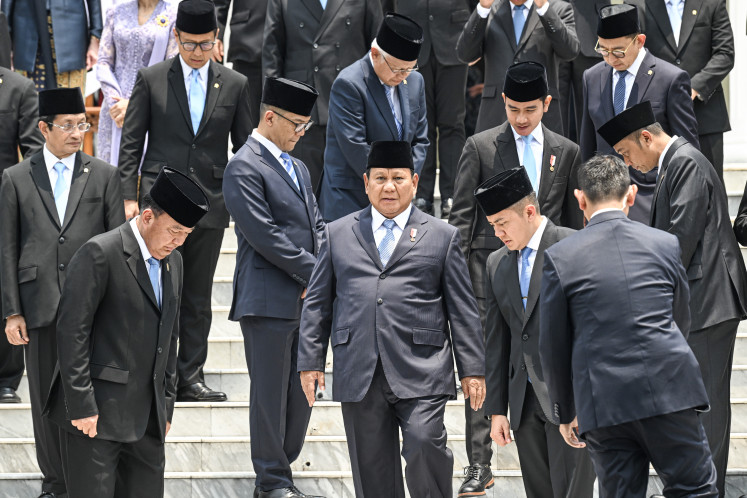Popular Reads
Top Results
Can't find what you're looking for?
View all search resultsPopular Reads
Top Results
Can't find what you're looking for?
View all search resultsLivestock farmers urged to become antibiotic-free
While some farmers are struggling to keep up with the global demand to phase out the use of antibiotics as a growth promoters in livestock, a poultry farmer from North Sumatra has adopted a healthier approach since starting his business
Change text size
Gift Premium Articles
to Anyone
W
hile some farmers are struggling to keep up with the global demand to phase out the use of antibiotics as a growth promoters in livestock, a poultry farmer from North Sumatra has adopted a healthier approach since starting his business.
Over the four years that Akhmad Sofyan has raised ducks and chickens for their eggs and meat, he has never used antibiotics because he believes that it poses a health risk to consumers.
“I’ve been informed that the use of antibiotics to promote growth is dangerous in the long run, especially on farms where [poultry] are raised,” he told The Jakarta Post on Monday.
Akhmad, who lives in Deli Serdang regency and currently owns around 1,000 ducks and chickens, uses homemade herbs to keep his poultry healthy.
Homemade herbs cost him about Rp 12,000 (84 US cents) to Rp 15,000 per 100 liters of water. He mixes about one spoon of herbs in 5l of water per serving. The solid part of the herbs are mixed into the poultry feed.
The herbs are affordable and easy to find. He grows them himself or finds them on nearby farms and at traditional markets.
Akhmad, a member the Indonesian Farmers Union (SPI) North Sumatra chapter, said most farmers in the province also raised antibiotic-free poultry.
“We want to achieve food sustainability by not relying too much on big food companies,” he added.
Over the years, the United Nations and the global community have warned about the use of antibiotics and other antimicrobials to promote growth in livestock because they pose a health risk to humans.
In November last year, the World Health Organization (WHO) issued a guideline recommending that farmers and the food industry should stop the regular use of antibiotics for growth promotion and disease prevention in healthy animals.
The WHO’s recommendations aim to “help preserve the effectiveness of antibiotics that are important for human medicine by reducing their unnecessary use in animals”.
At a recent event, the UN Food and Agriculture Organization (FAO) Emergency Center for Transboundary Animal Diseases (ECTAD) Indonesia team leader James McGrane warned that the misuse and overuse of antibiotics in animals and humans could place the latter at great risk due to antimicrobial resistance.
The FAO estimated that about 60,000 tons of antimicrobials are used globally in livestock every year, and the amount is projected to rise by 67 percent to 106,000 tons in global use by 2030 with the growing demand for animal products.
“If we don’t do anything, it is estimated that human deaths associated with infections caused by bacteria resistant to antibiotics could reach 10 million by 2050, with half of those fatalities occurring in Asia,” McGrane said.
The government banned all use of antibiotics as growth promoters in animal husbandry through a 2017 Agriculture Minister Regulation on the classification of animal drugs, effective since Jan. 1.
The ban was put in place to reduce the negative impact on humans who consumed animal products and to prevent antimicrobial resistance.
The regulation still allows for certain antibiotics to be used for treatment purposes — for a maximum of seven days. The antibiotics must be purchased based on a prescription and used under the supervision of a veterinarian.
“We have tried to convince farmers that using antibiotics as growth promoters only provide temporary benefits and can be very harmful in the long-term,” said the Agriculture Ministry’s director of animal health, Fadjar Sumping Tjatur Rasa.










